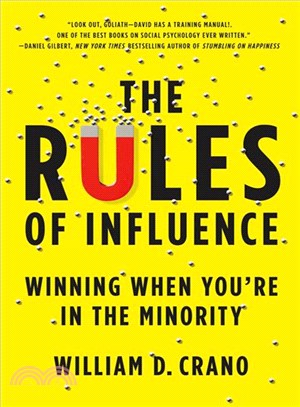相關商品
商品簡介
作者簡介
名人/編輯推薦
書摘/試閱
商品簡介
Use the science of persuasion to win people over—even when you’re outnumbered and overmatched
No one doubts the power of the majority. It makes all of the rules, and most of us are willing to go along, but what happens when you’re not? What about those issues that are so important to you that you’re willing to take on the naysayers?
It doesn’t matter if you’re trying to market and sell a product or service, persuade colleagues to try out a new business plan, or simply convince your family where to go for dinner in all of these cases you’re going up against the majority. And while minorities fail in countless ways, these scientifically proven strategies will lead you to success.
* Working from the inside: Outsiders are easy to dismiss. It’s pivotal to work with the majority’s interests in mind.
* Focusing on the problem: Through persistence and consistency, you have much more power on a single issue even when you’re outnumbered.
* Cracking the majority: There’s no majority without consensus. A single dissenting voice starts hundreds of fractures.
By applying the science of persuasion to those moments in your life when you’re overmatched, Dr. William Crano—an expert in the field of influence—gives you the tools to overcome overwhelming odds and take back control.
No one doubts the power of the majority. It makes all of the rules, and most of us are willing to go along, but what happens when you’re not? What about those issues that are so important to you that you’re willing to take on the naysayers?
It doesn’t matter if you’re trying to market and sell a product or service, persuade colleagues to try out a new business plan, or simply convince your family where to go for dinner in all of these cases you’re going up against the majority. And while minorities fail in countless ways, these scientifically proven strategies will lead you to success.
* Working from the inside: Outsiders are easy to dismiss. It’s pivotal to work with the majority’s interests in mind.
* Focusing on the problem: Through persistence and consistency, you have much more power on a single issue even when you’re outnumbered.
* Cracking the majority: There’s no majority without consensus. A single dissenting voice starts hundreds of fractures.
By applying the science of persuasion to those moments in your life when you’re overmatched, Dr. William Crano—an expert in the field of influence—gives you the tools to overcome overwhelming odds and take back control.
作者簡介
Dr. William D. Crano is a professor of psychology at Claremont Graduate University, an American Psychological Association and Association for Psychological Science fellow, and a former NATO senior scientist. He is married with three children and lives in California.
名人/編輯推薦
Praise for The Rules of Influence
"Look out, Goliath-David has a training manual! In this smart and engaging book, Crano uses cutting-edge scientific research to show us how the few can influence the many, and how the weak can beat the strong. One of the best books on social psychology ever written."
---Daniel Gilbert, New York Times bestselling author of Stumbling on Happiness
"Machiavelli had it easy - all he had to do was advise one Prince on how to gain power and how to keep it. William Crano has chosen the opposite, and more difficult task: to advise citizens in a democracy on how to be heard, and listened to, by the powers that be. Based on deep layers of research, yet written with verve, this thoughtful book is an essential manual for informed social action."
---Mihaly Csikszentmihalyi, bestselling author of Flow: The Psychology of Optimal Experience and Good Business
"The Rules of Influence by Crano is the seminal work defining specifically how those in the minority must proceed if they are to influence others and cause change. Groundbreaking. Fascinating. Brilliant."
---Kevin Hogan, Psy.D., author of The Science of Influence
"The author succeeds in explaining the concepts and studies in a manner accessible even to readers with no prior knowledge of social psychology, and he cites abundant examples of the success of his proposed rules from history and politics."
--Kirkus Reviews
"Clearly it's important to allow those with minority views to have voices and influence in politics and business and on social issues. But what is the most effective way to effect change if your message is being drowned out by those in power? Crano lays out a set of effective rules of engagement for alternative thinkers that involves working from the inside, being persistent, staying on message, being flexible, and other strategies to give the little guy a chance for his voice to be heard."
--Booklist
"Look out, Goliath-David has a training manual! In this smart and engaging book, Crano uses cutting-edge scientific research to show us how the few can influence the many, and how the weak can beat the strong. One of the best books on social psychology ever written."
---Daniel Gilbert, New York Times bestselling author of Stumbling on Happiness
"Machiavelli had it easy - all he had to do was advise one Prince on how to gain power and how to keep it. William Crano has chosen the opposite, and more difficult task: to advise citizens in a democracy on how to be heard, and listened to, by the powers that be. Based on deep layers of research, yet written with verve, this thoughtful book is an essential manual for informed social action."
---Mihaly Csikszentmihalyi, bestselling author of Flow: The Psychology of Optimal Experience and Good Business
"The Rules of Influence by Crano is the seminal work defining specifically how those in the minority must proceed if they are to influence others and cause change. Groundbreaking. Fascinating. Brilliant."
---Kevin Hogan, Psy.D., author of The Science of Influence
"The author succeeds in explaining the concepts and studies in a manner accessible even to readers with no prior knowledge of social psychology, and he cites abundant examples of the success of his proposed rules from history and politics."
--Kirkus Reviews
"Clearly it's important to allow those with minority views to have voices and influence in politics and business and on social issues. But what is the most effective way to effect change if your message is being drowned out by those in power? Crano lays out a set of effective rules of engagement for alternative thinkers that involves working from the inside, being persistent, staying on message, being flexible, and other strategies to give the little guy a chance for his voice to be heard."
--Booklist
書摘/試閱
Who and What Is a Minority?
Everything great and intelligent resides in the minority.
-Goethe
Although race and ethnicity often spring to mind when the word minority is used, these features are, for our purposes, not particularly important determinants of minority status. Minority groups come in all shapes, sizes, and colors, and while it is true that minorities sometimes are identified by obvious physical features like skin color, sex, height, or weight, even definitions based on physical features can shift according to circumstance. Princeton University was established in 1746, and for more than 200 years, Old Nassau admitted only males as full-time students. In 1961, Sabra Meservey was accepted into the Oriental Studies graduate program.3 She was the first and only woman officially enrolled in the school at the time, and to her credit gained a master's degree two years later. Then, as now, women outnumbered men in the state and the country. Women were the numeric majority, but Sabra Meservey, a woman, was decidedly in the minority at Princeton University. Place and circumstance matter.
Along with demographics, majority or minority status also can be based on beliefs or behaviors. Suppose you are a member of the Republican National Committee. At a meeting of the state chairpersons, you realize that the vast majority of the committee's membership is male. If you are a male, you are by simple arithmetic in the group's demographic majority; if female, you are in the minority. These demographic differences might not affect your work on the committee or the reception you receive from your fellow delegates, but suppose that while talking with them, you mention that you heartily agreed with President Obama's decision to bail out the auto companies. This position is unquestionably contrary to the committee's and the party's stated position, and no matter your demographic features, you have just jumped squarely into the minority.4 Your deviation from the company line has placed you there, irrespective of your sex, age, race, religion, height, weight, or accent. Even if all these other features conform perfectly to the picture of the average Republican National Committee state chairperson, you still are in the minority. Opinions matter, and most of the time, they matter more than demographics when determining your status in the groups in which you find yourself.
This example points to at least two different types of minorities, demographic minorities and opinion minorities. Demographic minorities consist of individuals with physical features that differ from those of the majorities of their membership groups. Opinion minorities, on the other hand, hold positions at odds with the majority's. Because we are concerned primarily with influence, opinion minorities will command most of our attention, but the rules of influence operate irrespective of the type of minority-remember, in our work, minority is shorthand for groups or individuals with limited (or no) power to force acceptance of their positions. At the individual level, we are concerned with your capacity to influence others when they, not you, hold the upper hand, and research on minority influence provides the basis for this understanding. I believe it is critical to understand how minority groups exercise influence to understand how we can influence others when we do not have the power to force compliance.
Number and Power and the Definition of Legitimacy
To understand minority influence, it is important to understand what is meant by minority. In social research, minorities usually are defined in terms of number or power, neither of which, individually, captures the full meaning of the word. In combination, however, they paint a useful picture.
Number
In experimental laboratory research, number is the most common feature used to define minority or majority group status. The group with the most members is the majority and groups with fewer members are minorities. This research typically creates or assembles real or virtual groups of strangers who hold (or are said to hold) perceptions or opinions that are divergent from those of the majority, to which you belong. Research subjects may be told that 82 percent of their group holds a particular attitude, which is consistent with theirs. The subjects themselves are in the majority in this situation. Or, they might learn that only 18 percent of their fellow research participants hold a position consistent with theirs. In this case, the subjects are in the minority. The research is concerned with people's reactions to this type of information. In some cases, the disagreement between majority and minority does not involve attitudes or opinions, but rather a simple perception-for example, you might be asked to judge the color of a large circle that is projected onto a movie screen or large flat-screen monitor. You and most of your group report seeing the circle as blue, but a small subset of the group might insist that the circle is green. How you come to grips with their disagreement on a fundamental perception, how the opposing groups interact with each other, and the conditions that lead to the minority's success or failure in influencing the majority are the kinds of questions asked in research of this type.5
Number is used frequently in laboratory research because it is a convenient and efficient way of creating majority and minority groups, but it is only one, and probably not the most important indicator of majority or minority status. Another factor, power, often overwhelms number in determining minority status. Among other features, power has the unique capacity to define virtue or propriety, which in turn affects persuasion.
Power (or Status)
Before the end of apartheid in South Africa, whites ran the show. The black population was probably ten times that of the white population, but was considered the minority despite its overwhelming numbers. White rulers had the power to enforce their will and applied it ruthlessly. For many years, the white power structure wielded sufficient force to maintain its dominance. Number did not define majority status-power did. When the civilized world ultimately responded to the injustice of the system of apartheid through boycotts and ostracism of all things South African, the balance of power shifted. The force the white rulers of the country wielded could not be supported, and the practice of apartheid disintegrated.
Power is a key factor in defining group status. As shown in this example, power and number are not synonymous. The majority is the group with the muscle, even if it lacks numbers. A group may be accorded majority status because it controls resources-power-even if it is numerically inferior.
Writings by and about Jack Welch, the former and wildly successful CEO of General Electric, provide many interesting and instructive examples of the creative use of power, and power's capacity to define majority and minority status. Welch was one of the most dynamic company CEOs in the history of American business. He was involved in the smallest details of his company. He seemed to know everything and everyone who worked at GE, no small feat for the boss of one of the largest and most powerful engines of the U.S. economy.
Welch often consulted with his division managers and their staffs on the many issues with which a company of GE's size had to contend. Sometimes in these meetings, the obvious solution to problems would emerge organically over the course of the discussion. Jack Welch was an intuitive leader with an uncanny ability to work through problems, and to bring his employees with him, so that the proper plan of action evolved progressively over the course of their interactions. When it did not, he would lay out the conflicting alternatives about the decisions that could be made. Although there might be twenty people in the room, and nineteen of them felt that GE should move in one direction, the remaining voice often prevailed-if it was Welch's.viii In this circumstance, as in many others we will consider, number did not rule, power did. Even when outnumbered, the person in charge is the majority. Number does not matter when it is confronted by superior force.
Everything great and intelligent resides in the minority.
-Goethe
Although race and ethnicity often spring to mind when the word minority is used, these features are, for our purposes, not particularly important determinants of minority status. Minority groups come in all shapes, sizes, and colors, and while it is true that minorities sometimes are identified by obvious physical features like skin color, sex, height, or weight, even definitions based on physical features can shift according to circumstance. Princeton University was established in 1746, and for more than 200 years, Old Nassau admitted only males as full-time students. In 1961, Sabra Meservey was accepted into the Oriental Studies graduate program.3 She was the first and only woman officially enrolled in the school at the time, and to her credit gained a master's degree two years later. Then, as now, women outnumbered men in the state and the country. Women were the numeric majority, but Sabra Meservey, a woman, was decidedly in the minority at Princeton University. Place and circumstance matter.
Along with demographics, majority or minority status also can be based on beliefs or behaviors. Suppose you are a member of the Republican National Committee. At a meeting of the state chairpersons, you realize that the vast majority of the committee's membership is male. If you are a male, you are by simple arithmetic in the group's demographic majority; if female, you are in the minority. These demographic differences might not affect your work on the committee or the reception you receive from your fellow delegates, but suppose that while talking with them, you mention that you heartily agreed with President Obama's decision to bail out the auto companies. This position is unquestionably contrary to the committee's and the party's stated position, and no matter your demographic features, you have just jumped squarely into the minority.4 Your deviation from the company line has placed you there, irrespective of your sex, age, race, religion, height, weight, or accent. Even if all these other features conform perfectly to the picture of the average Republican National Committee state chairperson, you still are in the minority. Opinions matter, and most of the time, they matter more than demographics when determining your status in the groups in which you find yourself.
This example points to at least two different types of minorities, demographic minorities and opinion minorities. Demographic minorities consist of individuals with physical features that differ from those of the majorities of their membership groups. Opinion minorities, on the other hand, hold positions at odds with the majority's. Because we are concerned primarily with influence, opinion minorities will command most of our attention, but the rules of influence operate irrespective of the type of minority-remember, in our work, minority is shorthand for groups or individuals with limited (or no) power to force acceptance of their positions. At the individual level, we are concerned with your capacity to influence others when they, not you, hold the upper hand, and research on minority influence provides the basis for this understanding. I believe it is critical to understand how minority groups exercise influence to understand how we can influence others when we do not have the power to force compliance.
Number and Power and the Definition of Legitimacy
To understand minority influence, it is important to understand what is meant by minority. In social research, minorities usually are defined in terms of number or power, neither of which, individually, captures the full meaning of the word. In combination, however, they paint a useful picture.
Number
In experimental laboratory research, number is the most common feature used to define minority or majority group status. The group with the most members is the majority and groups with fewer members are minorities. This research typically creates or assembles real or virtual groups of strangers who hold (or are said to hold) perceptions or opinions that are divergent from those of the majority, to which you belong. Research subjects may be told that 82 percent of their group holds a particular attitude, which is consistent with theirs. The subjects themselves are in the majority in this situation. Or, they might learn that only 18 percent of their fellow research participants hold a position consistent with theirs. In this case, the subjects are in the minority. The research is concerned with people's reactions to this type of information. In some cases, the disagreement between majority and minority does not involve attitudes or opinions, but rather a simple perception-for example, you might be asked to judge the color of a large circle that is projected onto a movie screen or large flat-screen monitor. You and most of your group report seeing the circle as blue, but a small subset of the group might insist that the circle is green. How you come to grips with their disagreement on a fundamental perception, how the opposing groups interact with each other, and the conditions that lead to the minority's success or failure in influencing the majority are the kinds of questions asked in research of this type.5
Number is used frequently in laboratory research because it is a convenient and efficient way of creating majority and minority groups, but it is only one, and probably not the most important indicator of majority or minority status. Another factor, power, often overwhelms number in determining minority status. Among other features, power has the unique capacity to define virtue or propriety, which in turn affects persuasion.
Power (or Status)
Before the end of apartheid in South Africa, whites ran the show. The black population was probably ten times that of the white population, but was considered the minority despite its overwhelming numbers. White rulers had the power to enforce their will and applied it ruthlessly. For many years, the white power structure wielded sufficient force to maintain its dominance. Number did not define majority status-power did. When the civilized world ultimately responded to the injustice of the system of apartheid through boycotts and ostracism of all things South African, the balance of power shifted. The force the white rulers of the country wielded could not be supported, and the practice of apartheid disintegrated.
Power is a key factor in defining group status. As shown in this example, power and number are not synonymous. The majority is the group with the muscle, even if it lacks numbers. A group may be accorded majority status because it controls resources-power-even if it is numerically inferior.
Writings by and about Jack Welch, the former and wildly successful CEO of General Electric, provide many interesting and instructive examples of the creative use of power, and power's capacity to define majority and minority status. Welch was one of the most dynamic company CEOs in the history of American business. He was involved in the smallest details of his company. He seemed to know everything and everyone who worked at GE, no small feat for the boss of one of the largest and most powerful engines of the U.S. economy.
Welch often consulted with his division managers and their staffs on the many issues with which a company of GE's size had to contend. Sometimes in these meetings, the obvious solution to problems would emerge organically over the course of the discussion. Jack Welch was an intuitive leader with an uncanny ability to work through problems, and to bring his employees with him, so that the proper plan of action evolved progressively over the course of their interactions. When it did not, he would lay out the conflicting alternatives about the decisions that could be made. Although there might be twenty people in the room, and nineteen of them felt that GE should move in one direction, the remaining voice often prevailed-if it was Welch's.viii In this circumstance, as in many others we will consider, number did not rule, power did. Even when outnumbered, the person in charge is the majority. Number does not matter when it is confronted by superior force.
主題書展
更多
主題書展
更多書展本週66折
您曾經瀏覽過的商品
購物須知
外文書商品之書封,為出版社提供之樣本。實際出貨商品,以出版社所提供之現有版本為主。部份書籍,因出版社供應狀況特殊,匯率將依實際狀況做調整。
無庫存之商品,在您完成訂單程序之後,將以空運的方式為你下單調貨。為了縮短等待的時間,建議您將外文書與其他商品分開下單,以獲得最快的取貨速度,平均調貨時間為1~2個月。
為了保護您的權益,「三民網路書店」提供會員七日商品鑑賞期(收到商品為起始日)。
若要辦理退貨,請在商品鑑賞期內寄回,且商品必須是全新狀態與完整包裝(商品、附件、發票、隨貨贈品等)否則恕不接受退貨。
























